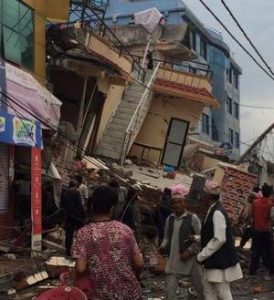 Janjivan Bureau / Baghdad/Ankara : More than 300 people were killed in Iran when a magnitude 7.3 earthquake jolted the Iran-Iraq border on Sunday, state media said, and rescuers were searching for dozens trapped under rubble in the mountainous area. At least six have died in Iraq as well.
Janjivan Bureau / Baghdad/Ankara : More than 300 people were killed in Iran when a magnitude 7.3 earthquake jolted the Iran-Iraq border on Sunday, state media said, and rescuers were searching for dozens trapped under rubble in the mountainous area. At least six have died in Iraq as well.
State television said more than 336 people were killed in Iran and at least 3,950 were injured. Local officials said the death toll would rise as search and rescue teams reached remote areas of Iran.
The earthquake was felt in several western provinces of Iran, but the hardest hit province was Kermanshah, which announced three days of mourning. More than 236 of the victims were in Sarpol-e Zahab county in Kermanshah province, about 15 km (10 miles) from the Iraq border.
Iranian state television said the quake had caused heavy damage in some villages where houses were made of earthen bricks. Rescuers were labouring to find survivors trapped under collapsed buildings.
The quake also triggered landslides that hindered rescue efforts, officials told state television. At least 14 provinces in Iran had been affected, Iranian media reported.
Iranian Supreme Leader Ayatollah Ali Khamenei offered his condolences on Monday, urging all government agencies to do all they could to help those affected.
The US Geological Survey said the quake measured magnitude 7.3. An Iraqi meteorology official put its magnitude at 6.5 with the epicentre in Penjwin in Sulaimaniyah province in the Kurdistan region, close to the main border crossing with Iran.
Kurdish health officials said at least six people were killed in Iraq and at least 68 injured. Iraq’s health and local officials said the worst-hit area was Darbandikham district, near the border with Iran, where at least 10 houses had collapsed and the district’s only hospital was severely damaged.
The quake was felt as far south as Baghdad, where many residents rushed from their houses and tall buildings when tremors shook the Iraqi capital.
“I was sitting with my kids having dinner and suddenly the building was just dancing in the air,” said Majida Ameer, who ran out of her building in the capital’s Salihiya district with her three children.
“I thought at first that it was a huge bomb. But then I heard everyone around me screaming: ‘Earthquake!’” Similar scenes unfolded in Erbil, the capital of the Kurdistan Region, and across other cities in northern Iraq, close to the quake’s epicentre.
Residents of Turkey’s southeastern city of Diyarbakir also reported feeling a strong tremor, but there were no immediate reports of damage or casualties there.
Turkish Red Crescent Chairman Kerem Kinik told broadcaster NTV that Red Crescent teams in Erbil were preparing to go to the site of the earthquake and that Turkey’s national disaster management agency, AFAD, and National Medical Rescue Teams were also preparing to head into Iraq.
AFAD’s chairman said the organisation was waiting for a reply to its offer for help.
In a tweet, Kinik said the Turkish Red Crescent was gathering 3,000 tents and heaters, 10,000 beds and blankets and moving them towards the Iraqi border.
“We are coordinating with Iranian and Iraqi Red Crescent groups. We are also getting prepared to make deliveries from our northern Iraq Erbil depot,” he said.
Israeli media said the quake was felt in many parts of Israel as well. In a statement, Israeli Intelligence Minister Israel Katz said, “My condolences to the people of Iran and Iraq over the loss of human life caused by the earthquake.” Iran refuses to recognise Israel.

















